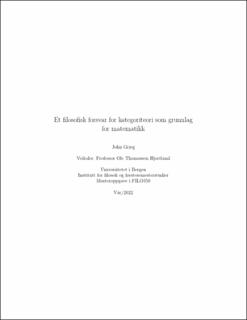Et filosofisk forsvar for kategoriteori som grunnlag for matematikk
Master thesis
Permanent lenke
https://hdl.handle.net/11250/3092894Utgivelsesdato
2022-05-20Metadata
Vis full innførselSamlinger
- Master theses [32]
Sammendrag
Det finnes ikke noe overnaturlig, verden forstås gjennom vitenskap og matematikk som gir innsikt i hvordan naturen fungerer. Matematikk er heller ikke overnaturlig. Det er utgangspunktet for denne oppgaven. Første del av argumentasjonen vil ta for seg det opprinnelige Quine-Putman argumentet, uunnværlighetsargumentet (UA), som sier at vår tillit til vitenskap forplikter oss til å tro på at matematiske objekter eksisterer. Etter presentasjonen av UA vil oppgaven se på hvilken matematikk vi er forpliktet til og hva denne bygger på. Andre del av argumentasjonen vil ta for seg det vi kan kalle den forklarende versjonen av UA (UA2) som sier at vi er forpliktet til den matematikken som er uunnværlig for å forklare verden. Her vil jeg ta for meg hva det vil si å forklare verden ved hjelp av matematikk og se p å hvilken matematikk som har forklarende tyngde med hensyn til å forstå verden. I tredje del vil vi se på hva som er den matematikken som er uunnværlig og hva denne matematikken kan bygge på (hva som er denne matematikkens grunnlag) og argumentere for pluralistisk matematikk basert på kategoriteori. Mot slutten vil vi se fremover se på hvilken matematikk vi vil være forpliktet til i fremtiden. There is nothing supernatural, the world is understood through science and mathematics that provides insight into how nature works. Math is not either supernatural. That is the starting point for this task. The first part of the argument will address the original Quine-Putman argument, the indispensability argument (UA), which states that our trust in science commits us to to believe that mathematical objects exist. After the presentation of the UA will the task looks at what mathematics we are committed to and what this is based on. The second part of the argument will address what we can call the explanatory the version of UA (UA2) which states that we are committed to the mathematics that is indispensable to explain the world. Here I will consider what that means to explain the world using mathematics and look at which mathematics has weight in terms of understanding the world. In the third part we will look at what is the mathematics that is indispensable and what this mathematics can build on (what is the basis of this mathematics) and argue for pluralistic mathematics based on category theory. Towards the end we will look ahead look at which mathematics we will be committed to in the future.
